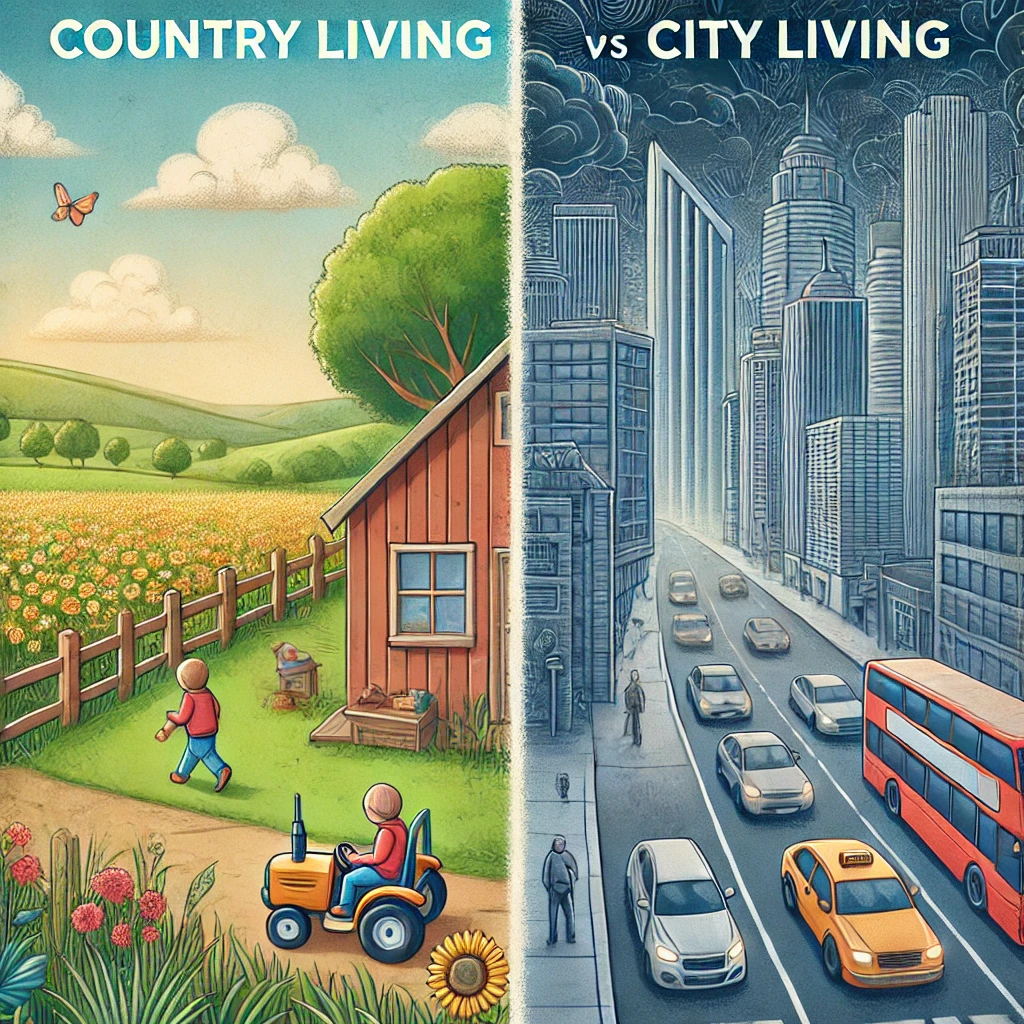
- By: Shaun
- Comments (0)
- Sep 23
Where a child grows up can have a profound effect on their mental health. The contrasts between rural and urban environments—such as access to nature, social interactions, and lifestyle differences—can shape children’s emotional well-being in unique ways. Let’s explore the pros and cons of country living versus city living and how each environment impacts a child’s mental health.
Benefits of Country Living for Mental Health
Access to Nature and Outdoor Play
One of the key advantages of growing up in the country is access to nature. Studies have shown that spending time in nature can reduce stress, anxiety, and depression. Children in rural areas often have the opportunity to play outdoors more frequently, engaging in activities like hiking, climbing, or simply exploring their surroundings. This connection to nature promotes physical health and mental well-being by encouraging outdoor play and reducing the overstimulation often found in urban settings.
Lower Stress Levels
Country living generally offers a slower, less stressful pace of life. With less noise, traffic, and crowds, rural areas provide a peaceful environment that can have a calming effect on children. This lower level of stress can contribute to better mental health, allowing children to focus on creative play, academics, or simply enjoying quiet time.
Stronger Sense of Community
Children growing up in rural areas may benefit from a stronger sense of community. Smaller towns often foster close-knit relationships where families know their neighbors and children develop meaningful friendships within the community. This sense of belonging and connection can help children feel secure and supported, which is crucial for their emotional development.
Challenges of Country Living for Mental Health
Limited Social Opportunities
While rural areas may offer a strong sense of community, they often have fewer social and extracurricular opportunities for children. Activities like sports teams, clubs, or arts programs may be less accessible, which can limit a child’s ability to explore different interests or make friends outside their immediate circle. This can sometimes lead to feelings of isolation, particularly for children who crave more social engagement.
Reduced Access to Mental Health Services
In rural areas, access to mental health services can be limited. Children experiencing mental health challenges may have fewer resources or specialists available nearby, which can make it difficult to get timely support. Long travel distances to clinics or counselors can create barriers to receiving consistent care, especially for families with limited transportation.
Benefits of City Living for Mental Health
Exposure to Diverse Cultures and Ideas
City life offers children the opportunity to be exposed to diverse cultures, people, and ideas. This exposure helps foster open-mindedness, empathy, and a broader worldview, all of which are important for emotional and social development. Urban areas often have a wealth of cultural experiences, such as museums, theater, festivals, and multicultural communities, that can enrich a child’s understanding of the world and enhance their cognitive and emotional growth.
Access to Extracurricular Activities
Cities tend to offer a wide range of extracurricular activities, from sports teams to music lessons and art classes. These opportunities allow children to explore their interests, develop new skills, and build friendships outside of school. Engaging in these activities can contribute to higher self-esteem and a sense of achievement, which are key to maintaining positive mental health.
Availability of Mental Health Services
In urban areas, children generally have easier access to mental health services. Cities typically have more therapists, counselors, and specialized programs available for children experiencing mental health challenges. Having access to a variety of support services makes it easier for families to seek early intervention and consistent care, which is essential for maintaining mental well-being.
Challenges of City Living for Mental Health
Overstimulation and Stress
City living often comes with higher levels of noise, traffic, and overstimulation, which can be overwhelming for children. Constant exposure to crowded spaces and fast-paced environments can lead to increased stress, anxiety, and even sensory overload in some children. The demands of urban life may also leave less time for relaxation or outdoor play, which can negatively impact a child’s mental health.
Limited Time in Nature
While city parks and green spaces are available, children in urban areas may not have as much daily access to nature as their rural counterparts. Limited time outdoors and fewer opportunities for free play in natural environments can affect a child’s ability to de-stress and recharge. This disconnection from nature can contribute to feelings of restlessness or anxiety.
Conclusion
Both country and city living offer unique advantages and challenges when it comes to children’s mental health. Country life provides access to nature, lower stress levels, and a strong sense of community, while city life offers cultural exposure, extracurricular opportunities, and better access to mental health services. Understanding how each environment shapes a child’s well-being can help parents make informed decisions and ensure their child’s emotional needs are met, no matter where they grow up.
Sources
- American Academy of Child & Adolescent Psychiatry (AACAP)
- Centers for Disease Control and Prevention (CDC)
- National Institutes of Health (NIH)
- access to nature
- childhood development
- childhood stress
- children's mental health
- city living
- country living
- cultural exposure
- extracurricular activities
- family environment
- mental health challenges
- Mental Health Services
- mental well-being
- outdoor play
- parenting decisions
- rural life
- rural vs urban life
- sense of community
- social opportunities
- stress levels
- urban life